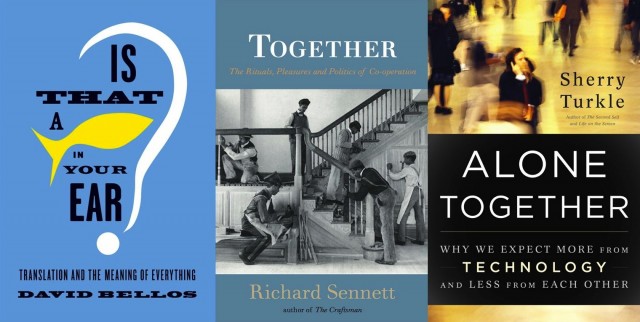
The Second Annual Zócalo Public Square Book Prize is made possible by the generous support of Southern California Gas Company.
Twenty years ago, Rodney King asked, “Can we all get along?” The phrase is a punch line today-and yet this year King’s question was on the minds of economists and digital game designers, lawyers and cognitive scientists, literary theorists and even a king.
These were among the authors nominated for the Second Annual Zócalo Public Square Book Prize. The prize will go to the author of the nonfiction book published in the past year that our judges deemed to be the most effective in deepening our understanding of community. The broad range of books we considered (an initial list of 100, narrowed down to a longlist of 11) demonstrates that Zócalo isn’t alone in exploring ideas about community and citizenship-and that community means much more than the neighborhoods we live in.
In the end, our judges emerged with three outstanding contenders. We’ll announce our winner on Thursday, March 15.
The author of the winning book will receive $5,000 and deliver a lecture at the ceremony on April 13, 2012:
Second Annual Zócalo Public Square Book Prize Award Ceremony, sponsored by Southern California Gas Company
Friday, April 13, 2012, 7:30 p.m.
Museum of Contemporary Art (MOCA)
250 South Grand Avenue
Los Angeles, CA
Here is an introduction to our finalists, and what our judges had to say about their favorites (shown here in alphabetical order by author):
Is That a Fish In Your Ear? Translation and the Meaning of Everything
by David Bellos
In an ever-smaller world of thousands of languages, we rely on translation to communicate with one another. But translation is never free of interpretation or values or preferences. Even if we speak the same language, we may be talking past one another, with immense gaps between what one person says and another person hears. In short, translation is so much more than what they do at the United Nations. It’s what we all do-or ought to do-in daily life. Author David Bellos, director of the Program in Translation and Intercultural Communication at Princeton University, offers a lively and provocative reflection on translation in all its facets. “It is translation, more than speech itself, that provides incontrovertible evidence of the human capacity to think and communicate thought,” Bellos writes. “We should do more of it.”
One of our judges calls Bellos’ book “witty and erudite,” and another says the book “taught me so much more about the beauty and power of being multi-lingual.” A third judge has a specific recommendation: “The chapter ‘How Many Words Do We Have for Coffee?’ is a gem.”
Together: The Rituals, Pleasures and Politics of Cooperation
by Richard Sennett
The more diverse we become, the harder it becomes to get along. People don’t easily socialize with those of different backgrounds or habits, and our politics divide us into like-minded camps. So what can a multiracial, multicultural society do to encourage people to cooperate better with one another?
University of Cambridge sociologist Richard Sennett argues that cooperation is a craft, one that can be mastered. Modern developments, he writes, “may repress and distort our capacity to live together, but do not, cannot, erase this capacity.”
One judge lauds Sennett for providing “an impressively capacious analysis of the conflict that political philosophers since the Greeks have identified as the central conflict in human history-that between the individual and society.” Another notes that Sennett has “written several influential books, and the latest may be one of his finest.”
Alone Together: Why We Expect More From Technology and Less From Each Other
by Sherry Turkle
Communicating across distances has never been easier. Thanks to Facebook, a New Yorker knows instantly what his Muscovite friend ate for breakfast (and what he’s planning for lunch). Our computers connect us to one another in myriad ways. But the result isn’t an increase in connectivity; it’s an increase in loneliness. That’s why, as we enter the “robotic moment,” people old and young are starting to question what we’re losing as we gain.
Sherry Turkle, the founder and director of the MIT Initiative on Technology and Self, argues for a reassessment of the role of devices and electronic connectivity in our modern life. “We deserve better,” Turkle writes. “When we remind ourselves that it is we who decide how to keep technology busy, we shall have better.”
Writes one judge: “In many ways this book is the technological companion to Robert Putnam’s Bowling Alone.” Says another judge: “Turkle’s writing is particularly affecting when she relates her thinking on technology to her own relations with her daughter.”
————————————-
Our longlist was equally diverse and impressive, and included investigations of love and marriage, dignity and evil. These books, in search of community, looked backward and forward in time, as far away as across the globe and as nearby as a few city blocks.
Here is our complete longlist, in alphabetical order by author:
Virtually You: The Dangerous Powers of the E-Personality by Elias Aboujaoude
In Search of Civilization: Remaking a Tarnished Idea by John Armstrong
The Science of Evil: On Empathy and the Origins of Cruelty by Simon Baron-Cohen
Is That A Fish In Your Ear? Translation and the Meaning of Everything by David Bellos
Marriage Confidential: The Post-Romantic Age of Workhorse Wives, Royal Children, Undersexed Spouses & Rebel Couples Who Are Rewriting the Rules by Pamela Haag
Dignity: The Essential Role It Plays in Resolving Conflict by Donna Hicks
Homesickness: An American History by Susan J. Matt
Love: A History by Simon May
Together: The Rituals, Pleasures and Politics of Cooperation by Richard Sennett
Alone Together: Why We Expect More from Technology and Less from Each Other by Sherry Turkle
The Neighborhood Project: Using Evolution to Improve My City, One Block at a Time by David Sloan Wilson





Send A Letter To the Editors